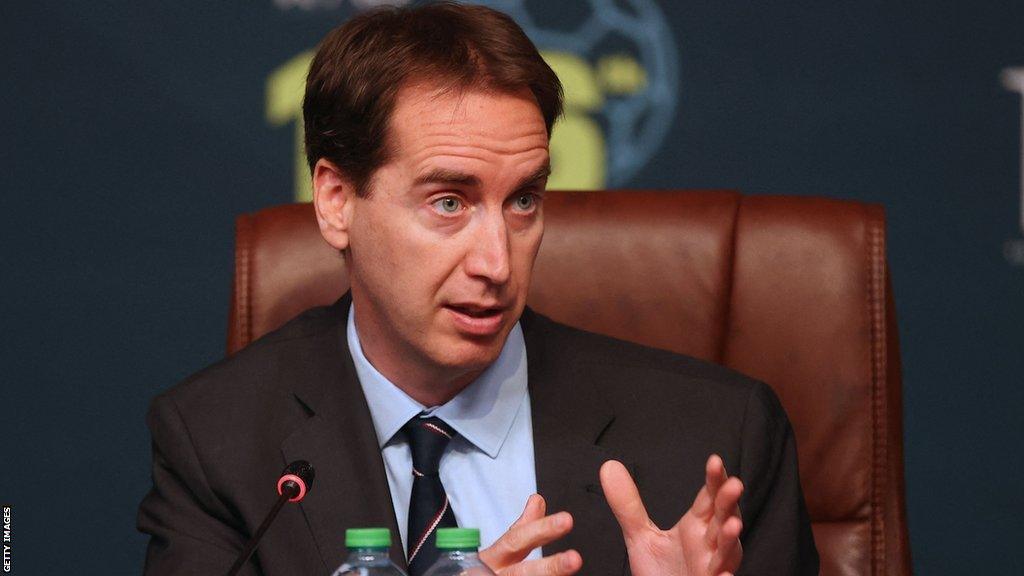Football Association Diversity Code: Clubs collectively fail to meet any recruitment targets
- Published

Mark Bullingham says there is a "huge amount of work to be done" to increase diversity in the English game
Clubs signed up to the Football Association's Diversity Code collectively failed to meet any of their recruitment targets over the past year.
FA chief executive Mark Bullingham says progress has been "slower than hoped" three years since the code's launch.
In response the FA will introduce mandatory diversity reporting for all professional clubs in the English game.
The FA, Premier League and Football League met all of their targets.
"We have seen progress across the FA, Premier League and EFL," said Bullingham. "However, the results show that there is still a huge amount of work to be done as overall the clubs are missing their targets."
Former Chelsea defender Paul Elliott, co-founder of the Diversity Code, added: "The code was never going to be an overnight solution, but it was a landmark moment for English football to collectively work together to drive meaningful change. The introduction of mandatory disclosure is the next step in this journey."
Chief executive of anti-discrimination charity Kick It Out Tony Burnett said mandatory diversity reporting is a "step in the right direction" but believes sanctions should be introduced for clubs that fail to meet targets.
"Now is the time to be bolder," he said. "We would urge the Premier League, EFL and all its 92 clubs to make that data transparent.
"But we also need sanctions for non-compliance and future diversity targets baked into FA, Premier League and EFL rules. Without that commitment, we won't know the true scale of the challenge nor be able to find solutions to make football more representative of the people who love the game."
The new mandatory rule, which will require clubs to report data on age, sex, gender, ethnicity, disability and sexual orientation within their organisations, is set to come into force for the start of the 2024-25 season.
'Natural evolution'
The FA says the move is the "natural evolution" of the Diversity Code, which was launched in 2020 with the aim of tackling racial inequality in the English game.
In total 51 clubs from across the Premier League, Football League and Women's Super League have signed up to the voluntary code, with each club having to provide data on their workforce annually.
In signing up, the clubs agree that:
15% of new executive appointments and team operations appointments will be from a black, Asian or of mixed heritage background, with 30% female.
25% of new coaching appointments will be black, Asian or of mixed heritage and 10% of senior coaching appointments.
50% of new coaching appointments at women's football clubs will be female, with 15% black, Asian or of mixed heritage.
Shortlists for interview will have at least one male and one female candidate of black, Asian or of mixed heritage, provided applicants meeting the job specifications apply.
Between 1 August 2022 and 31 July 2023 the clubs collectively failed to meet any of those recruitment targets, though some individual clubs did.
When combined with the FA, Premier League and EFL only one target was fully met, with more than 30% of new team operations appointments female.
Target | Clubs | FA/PL/EFL | Collective average |
15% of new executive appointments to be black, Asian or of mixed heritage | 9.1% | 27.3% | 9.4% |
30% female | 23% | 36.4% | 23.3% |
15% of new team operations appointments to be black, Asian or of mixed heritage | 11.2% | 20.2% | 11.7% |
30% female | 29.9% | 47.1% | 31% |
25% of new men's coaching appointments will be black, Asian or of mixed heritage | 16% | 50% | 16.2% |
10% of senior coaching appointments will be will be black, Asian or of mixed heritage | 8.9% | 100% | 9.4% |
50% of new women's football coaching appointments will be female | 41.6% | 50% | 42.1% |
15% of new women's coaching appointments will be black, Asian or of mixed heritage | 8.3% | 16.7% | 8.8% |
The FA says collective hiring rates for team operations and male and female coaches have remained at a fairly constant level over the three years of the code. However, hiring rates for black, Asian and mixed heritage senior leaders and senior coaches have both dropped.
Compared to previous years, the number of shortlists with a male black, Asian or mixed heritage background has continued to rise slightly from 46% in 2020/21 and 48% in 2021/22 to 52% in 2022/23.
The percentage of shortlists with a female black, Asian or mixed heritage candidate dropped to 47% from 51% in 2021/22, but is still significantly higher than the 17% in 2020/21.
Fulham was the best performing club, meeting nine of its 10 targets, with the other not applicable as they had not recruited any senior men's coaching roles that year. West Brom met eight targets, with the other two related to the women's team not applicable as they had not made any recruitment.

Our coverage of your Premier League club is bigger and better than ever before - follow your team and sign up for notifications in the BBC Sport app to make sure you never miss a moment
